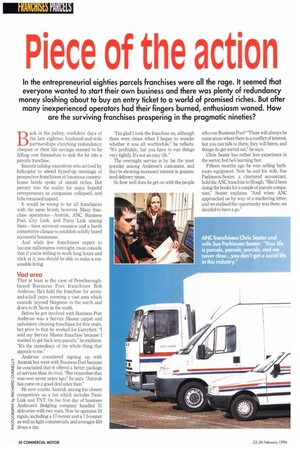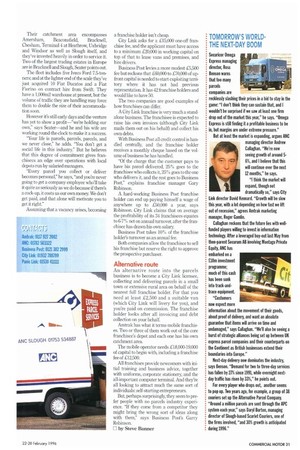Piece of the action
Page 32

Page 33

If you've noticed an error in this article please click here to report it so we can fix it.
In the entrepreneurial eighties parcels franchises were all the rage. It seemed that everyone wanted to start their own business and there was plenty of redundancy money sloshing about to buy an entry ticket to a world of promised riches. But after many inexperienced operators had their fingers burned, enthusiasm waned. How
are the surviving franchises prospering in the pragmatic nineties?
Back in the palmy, confident days of the late eighties, husband-and-wife partnerships clutching redundancy cheques or their life savings seemed to be falling over themselves to sink the lot into a parcels franchise.
Smooth-talking executives who arrived by helicopter to attend hyped-up meetings of prospective franchisees at luxurious countryhouse hotels spoke of untold riches. But penury was the reality for many hopeful entrepreneurs as companies collapsed, and bills remained unpaid.
It would be wrong to tar all franchisors with the same brush, however. Many franchise operations—Amtrak, ANC, Business Post, City Link, and Panic Link among them—have survived recession and a harsh competitive climate to establish solidly based successful businesses.
And while few franchisees expect to become millionaires overnight, most concede that if you're willing to work long hours and stick at it, you should be able to make a reasonable living.
Vast area
That at least is the view of Peterboroughbased Business Post franchisee Bob Ambrose, He's held the franchise for sevenand-a-half years, covering a vast area which extends beyond Skegness in the north and down to St Neots in the south.
Before he got involved with Business Post Ambrose was a Service Master carpet and upholstery cleaning franchisee for five years, but prior to that he worked for Carryfast: "I sold my Service Master franchise because I wanted to get back into parcels," he explains. "It's the immediacy of the whole thing that appeals to me."
Ambrose considered signing up with ›
71 Amtrak but went with Business Post because he concluded that it offered a better package 6 of services than its rival. But remember that
° was over seven years ago," he says. "Amtrak 0 m has come on a good deal since then." a i He now counts Amtrak among his closest o
E competitors on a list which includes Panic 1Link and TNT. On his first day of business Ambrose's fledgling company handled 31 1deliveries with two vans. Now he operates 10
0 rigids, including a 17-tonner and a 7.5-tonner 0
0 1– as well as light commercials, and averages 450
drops a day. "I'm glad I took the franchise on, although there were times when I began to wonder whether it was all worthwhile," he reflects. "It's profitable, but you have to run things very tightly. It's not an easy life."
The overnight service is by far the most popular among Ambrose's customers, and they're showing increased interest in guaranteed delivery times.
So how well does he get on with the people who run Business Post? "There will always be some areas where there is a conflict of interest, but you can talk to them, they will listen, and things do get sorted out," he says.
Chris Seater has rather less experience in the sector; but he's learning fast.
Fifteen months ago he was selling bathroom equipment. Now he and his wife, Sue Parkinson-Seater, a chartered accountant, hold the ANC franchise in Slough. "She'd been doing the books for a couple of parcels companies," Seater explains. "And when ANC approached us by way of a marketing letter, and we realised the opportunity was there, we decided to have a go." Their catchment area encompasses
Amer-sham, Beaconsfield, Bracknell, Chesharn, Terminal 4 at Heathrow, Uxbridge and Windsor as well as Slough itself, and they've invested heavily in order to service it. Two of the largest trading estates in Europe are in Bracknell and Slough, Seater points out.
The fleet includes five lveco Ford 7.5-tonners; and at the lighter end of the scale they've just acquired 10 Fiat Ducatos and a Fiat Fiorino on contract hire from Swift. They have a 1,000m2 warehouse at present, but the volume of traffic they are handling may force them to double the size of their accommodation soon.
However it's still early days and the venture has yet to show a profit—"we're holding our own," says Seater—and he and his wife are working round-the-clock to make it a success.
"Your life is parcels, parcels, parcels, and we never close," he adds. "You don't get a social life in this industry." But he believes that this degree of commitment gives franchisees an edge over operations with local depots run by salaried managers.
"Every parcel you collect or deliver becomes personal," he says, "and you're never going to get a company employee who'll take it quite as seriously as we do because if there's a cock-up, it costs us our own money. We don't get paid, and that alone will motivate you to get it right."
Assuming that a vacancy arises, becoming a franchise holder isn't cheap.
City Link asks for a £15,000 one-off franchise fee, and the applicant must have access to a minimum £20,000 in working capital on top of that to lease vans and premises, and hire drivers.
Business Post levies a more modest £5,500 fee but reckons that £60,000 to £70,000 of upfront capital is needed to start exploiting territory where it has not had previous representation. It has 42 franchise holders and would like to have 50.
The two companies are good examples of how franchises can differ.
A City Link franchise is very much a standalone business. The franchisee is expected to raise his own invoices (although City Link mails them out on his behalf) and collect his own debts.
With Business Post all credit control is handled centrally, and the franchise holder receives a monthly cheque based on the volume of business he has handled.
"Of the charge that the customer pays to have his parcel delivered, 25% goes to the franchisee who collects it, 25% goes to the one who delivers it, and the rest goes to Business Post," explains franchise manager Gary Robinson.
A hard-working Business Post franchise holder can end up paying himself a wage of anywhere up to .£50,000 a year, says Robinson. City Link claims that on average the profitability of its 34 franchisees equates to 6-7% net on annual turnover, after the franchisee has drawn his own salary Business Post takes 10% of the franchise holder's turnover as an annual fee.
Both companies allow the franchisee to sell his franchise but reserve the right to approve the prospective purchaser.
Alternative route
An alternative route into the parcels business is to become a City Link licensee, collecting and delivering parcels in a small town or extensive rural area on behalf of the nearest full franchise holder. For that you need at least £2,500 and a suitable van (which City Link will livery for you), and you're paid on commission. The franchise holder looks after all invoicing and debt collection on your behalf.
Amtrak has what it terms mobile franchises. Two or three of them work out of the core franchisee's depot and each one has his own catchment area.
The mobile operator needs £18,000-19,000 of capital to begin with, including a franchise fee of £12,500.
All franchises provide newcomers with initial training and business advice, together with uniforms, corporate stationery, and the all-important computer terminal. And they're all looking to attract much the same sort of individuals: self-starting entrepreneurs.
But, perhaps surprisingly, they seem to prefer people with no parcels industry experience. "If they come from a competitor they might bring the wrong sort of ideas along with them," says Business Post's Garry Robinson.
El by Steve Banner




































































































